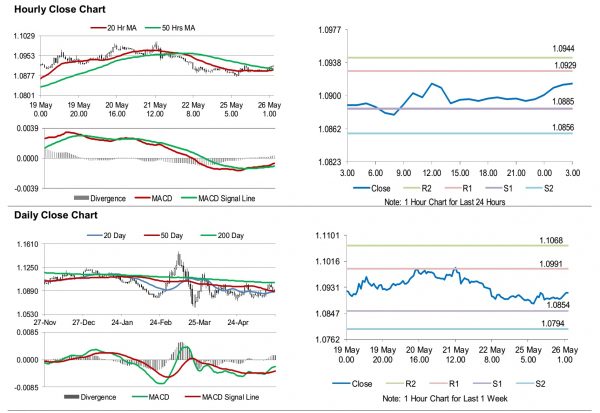For the 24 hours to 23:00 GMT, the EUR marginally rose against the USD and closed at 1.0896.
The European Central Bank (ECB), in its latest monetary policy meeting accounts, indicated that it is “fully prepared” to provide additional stimulus as soon as June to support the economy, if existing efforts are not adequate. Moreover, the ECB officials have ruled out the idea of a swift economic rebound from the pandemic.
On the macro front, Germany’s gross domestic product (GDP) fell 2.2% on a quarterly basis in the first quarter of 2020, recording its biggest fall since 2009 and compared to a revised fall of 0.1% in the prior month. The preliminary figures had indicated a fall of 2.2%. Moreover, the Ifo current assessment unexpectedly dropped to 78.9 in May, defying market expectations for a rise to a level of 80.0 and compared to a revised level of 79.4 in the previous month. Meanwhile, the Ifo business climate rose to 79.5 in May, more than expectations for a rise to a level of 78.3 and compared to a revised reading of 74.2 in the previous month. Additionally, the Ifo expectations climbed to 80.1 in May, more than market expectations for an advance to a level of 75.0 and compared to a reading of 69.4 in the previous month.
In the Asian session, at GMT0300, the pair is trading at 1.0914, with the EUR trading 0.17% higher against the USD from yesterday’s close.
The pair is expected to find support at 1.0885, and a fall through could take it to the next support level of 1.0856. The pair is expected to find its first resistance at 1.0929, and a rise through could take it to the next resistance level of 1.0944.
Looking forward, traders would keep a watch on Germany’s GfK consumer confidence index for June, slated to release in a few hours. Later in the day, the US Chicago Fed National Activity Index and new home sales, both for April along with the housing price index for March and the Dallas Fed manufacturing business index for May, would keep investors on their toes.
The currency pair is trading above its 20 Hr moving average and showing convergence with its 50 Hr moving average.

